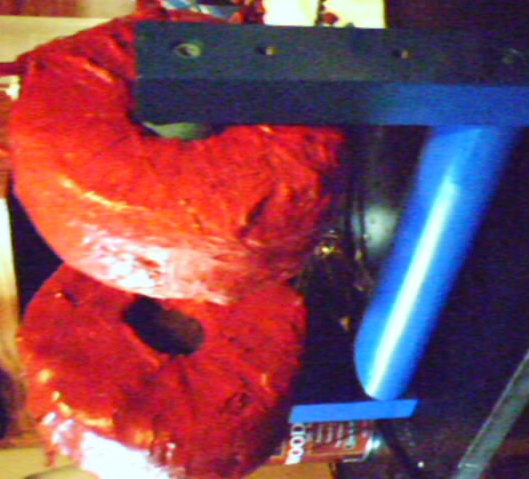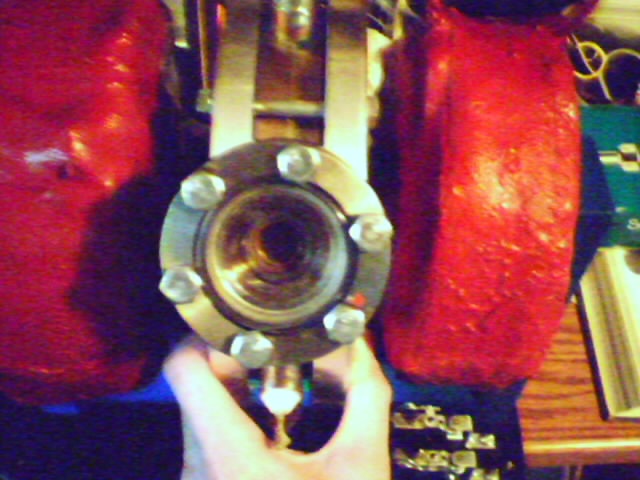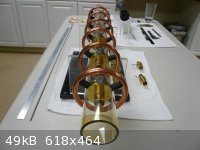| Pages:
1
..
3
4
5 |
gregxy
Hazard to Others
  
Posts: 421
Registered: 26-5-2006
Member Is Offline
Mood: No Mood
|
|
The radiation should not effect copper coils. Only semiconductors are susceptable. Did you work out the power disspiation for the coils? That would be
the main issue with them.
|
|
|
jtkelectroman
Harmless

Posts: 31
Registered: 13-3-2007
Location: The Great USA
Member Is Offline
Mood: No Mood
|
|
No I didn't figure out what the dissipation rate is. I just assumed that because they have good contact with the coolant line and the magnetic core
most of the heat should be carried away before they get too hot.
BTW here is a picture of the magnet without it's pole faces.

|
|
|
jtkelectroman
Harmless

Posts: 31
Registered: 13-3-2007
Location: The Great USA
Member Is Offline
Mood: No Mood
|
|
Here is a picture of me doing a test fit to see if there will still be enough room for the pole faces with the chamber in place. Keep in mind that I
need to make the pole faces yet.

|
|
|
atomicproject
Harmless

Posts: 12
Registered: 4-4-2006
Location: Livermore California
Member Is Offline
Mood: Thermonuclear
|
|
Several months ago I decided to wait on the cyclotron project as indicated in this thread:
http://www.sciencemadness.org/talk/viewthread.php?tid=11056
The magnet is certainly not going anywhere and I have always been intrigued with the VDG accelerator which started this thread. So, I decided to start
on that project first.
Pictured below is my test model (for engineering purposes only) which I will use as a blueprint for the real one (to be built next month). This model
allowed me to hone my skills related to glass cutting / drilling and to design certain aspects of the tube.
Here is a quick youtube video of my work thus far:
http://www.youtube.com/watch?v=es2zi2KVSmQ

|
|
|
jpsmith123
National Hazard
   
Posts: 764
Registered: 24-6-2005
Member Is Offline
Mood: No Mood
|
|
Hello Atomicproject,
I don't know how well your tube will work, but it looks nice so far.
I'm wondering: (1) How did you put the radius on the ends of your drift tubes, did you use some sort of forming tool bit? (2) How will you seal the
glass tube around where your radial "struts" are?
Also, regarding an electron gun, check out this place...they even have nanotube based triode field emission cathodes...look at their "model 102811 Field Emission Cold Triode Cathode ATC-CC
Series".
|
|
|
Eclectic
National Hazard
   
Posts: 899
Registered: 14-11-2004
Member Is Offline
Mood: Obsessive
|
|
Rather than drilling through the glass, perhaps you could use glass inner sleeves to space and fix the location of the drift tubes? Every drilled
hole weakens the tube and provides an oportunity for leakage.
|
|
|
atomicproject
Harmless

Posts: 12
Registered: 4-4-2006
Location: Livermore California
Member Is Offline
Mood: Thermonuclear
|
|
Regarding the following questions and suggestions:
1) The ends of the drift tubes were formed with a modified cobalt lathe bit. After machining, each was individually polished.
2) It was suggested to use Duxseal from a someone I consider to be reputable ( http://www.fusor.net/board/view.php?bn=fusor_vacuum&key=...). If it dosent work, I will probably invest in Apezion W or seal it in with Hysol
1C (which I know works.) The latter being epoxy which makes it a permanent fixture. This I want to avoid because it makes tear-down near impossible.
Any suggestions?
3) The Heat Wave Lab link is great. Lots of good ideas. I am fairly sure I will make my own as opposed to using one from the CRT.
4) Regarding drift tube placement. The equipotential rings must be electrically connected to each individual drift tube. I opted for the "hole
drilling" method as it lessens the amount of seams that need to be sealed (as in the segmented cascade tube depicted in the original design.) I think
your sleeve idea is excellent for a uniform placement and spacing of the tubes. I may try something like that for spacing and lessening the stress
placed on the drilled holes, but the holes will probably have to remain.
The more I think about it, I like the idea of having the drift tubes all connected in a non-conductive arrangement. This way the entire assembly can
be slid in and out of the containment tube for service and modification. It can probably be made similar to a CRT electron gun with all the tubes
connected with glass tubular struts (or maybe alumina tubing). Thanks Eclectic, I will probably start on this today.
|
|
|
watson.fawkes
International Hazard
    
Posts: 2793
Registered: 16-8-2008
Member Is Offline
Mood: No Mood
|
|
Quote: Originally posted by atomicproject  | | 4) [...] I opted for the "hole drilling" method as it lessens the amount of seams that need to be sealed (as in the segmented cascade tube depicted in
the original design.) |
You might consider flame polishing the holes you've drilled. It will minimize the
hazards of crack formation at the edges of those holes. You'll need to anneal afterward.
If you'd care to trade glassblowing for sealing, you could T-seal some Ace threads on each hole. Sealing is then done with gaskets and threaded caps,
possibly with feed-throughs.
|
|
|
jimcro55
Harmless

Posts: 1
Registered: 29-11-2010
Member Is Offline
Mood: No Mood
|
|
Do you know the measure of the wire mesh? What gauge diameter is the wire? any idea?
-J
http://www.bwire.com/
|
|
|
dehim
Harmless

Posts: 1
Registered: 10-3-2012
Member Is Offline
Mood: static
|
|
Tesla Coil
Dear mad scientists,
I have a Tesla Coil and i want to know if i can modify my tesla coil so i can create a particle accelerator
or do i really need a van de graaff generator?
Greatzzz,
Dédé
|
|
|
entropy51
Gone, but not forgotten
    
Posts: 1612
Registered: 30-5-2009
Member Is Offline
Mood: Fissile
|
|
Quote: Originally posted by dehim  | Dear mad scientists,
I have a Tesla Coil and i want to know if i can modify my tesla coil so i can create a particle accelerator
or do i really need a van de graaff generator?
|
It can be done, but it doesn't work very well. In the years just before Van de Graaff invented his generator Merle Tuve of the Carnegie Institute of
Washington built an oil immersed Tesla giving voltages above a megavolt and tried to use it to accelerate electrons and protons. This work is
described in a couple of articles in Physical Review around 1930.
Tuve did obtain beams of protons and observed them in a cloud chamber and looked for nuclear reactions. The work was not very successful, partly
because the oscillating voltage of the Tesla imposed voltage gradients on the accelerating tube that made it prone to voltage breakdown and puncture
of the glass insulators of the accelerating tube.
Right after Van de Graaff invented his generator Tuve and his group built 600 kV and 1.2 MV generators and almost immediately produced steady beams of
protons. They used these beams to confirm the work of Cockcroft and Walton as well as many original discoveries such as resonaces in nuclear
reactions. This work was published in Physical Review during the 1930's and several of their papers describe how much better the whole thing worked
with a Van de Graaff as opposed to a Tesla.
|
|
|
Texium
|
Thread Moved
20-11-2023 at 12:09 |
| Pages:
1
..
3
4
5 |